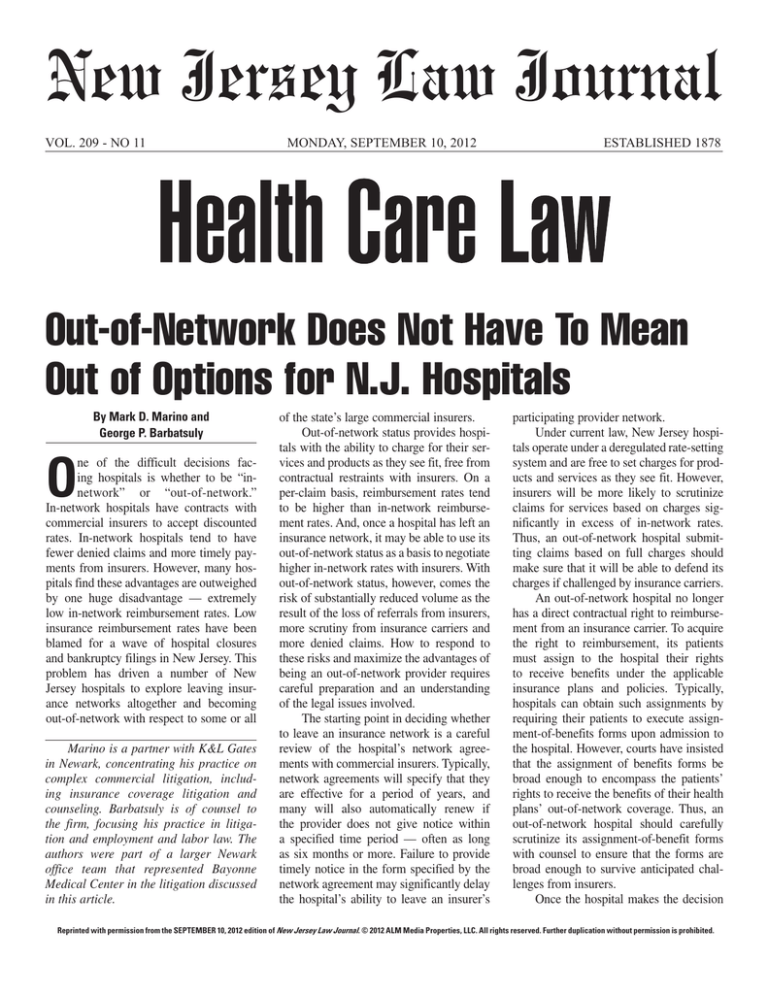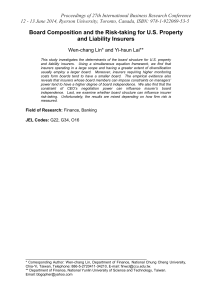
New Jersey Law Journal
VOL. 209 - NO 11
MONDAY, SEPTEMBER 10, 2012
ESTABLISHED 1878
Health Care Law
Out-of-Network Does Not Have To Mean
Out of Options for N.J. Hospitals
By Mark D. Marino and
George P. Barbatsuly
O
ne of the difficult decisions facing hospitals is whether to be “innetwork” or “out-of-network.”
In-network hospitals have contracts with
commercial insurers to accept discounted
rates. In-network hospitals tend to have
fewer denied claims and more timely payments from insurers. However, many hospitals find these advantages are outweighed
by one huge disadvantage — extremely
low in-network reimbursement rates. Low
insurance reimbursement rates have been
blamed for a wave of hospital closures
and bankruptcy filings in New Jersey. This
problem has driven a number of New
Jersey hospitals to explore leaving insurance networks altogether and becoming
out-of-network with respect to some or all
Marino is a partner with K&L Gates
in Newark, concentrating his practice on
complex commercial litigation, including insurance coverage litigation and
counseling. Barbatsuly is of counsel to
the firm, focusing his practice in litigation and employment and labor law. The
authors were part of a larger Newark
office team that represented Bayonne
Medical Center in the litigation discussed
in this article.
of the state’s large commercial insurers.
Out-of-network status provides hospitals with the ability to charge for their services and products as they see fit, free from
contractual restraints with insurers. On a
per-claim basis, reimbursement rates tend
to be higher than in-network reimbursement rates. And, once a hospital has left an
insurance network, it may be able to use its
out-of-network status as a basis to negotiate
higher in-network rates with insurers. With
out-of-network status, however, comes the
risk of substantially reduced volume as the
result of the loss of referrals from insurers,
more scrutiny from insurance carriers and
more denied claims. How to respond to
these risks and maximize the advantages of
being an out-of-network provider requires
careful preparation and an understanding
of the legal issues involved.
The starting point in deciding whether
to leave an insurance network is a careful
review of the hospital’s network agreements with commercial insurers. Typically,
network agreements will specify that they
are effective for a period of years, and
many will also automatically renew if
the provider does not give notice within
a specified time period — often as long
as six months or more. Failure to provide
timely notice in the form specified by the
network agreement may significantly delay
the hospital’s ability to leave an insurer’s
participating provider network.
Under current law, New Jersey hospitals operate under a deregulated rate-setting
system and are free to set charges for products and services as they see fit. However,
insurers will be more likely to scrutinize
claims for services based on charges significantly in excess of in-network rates.
Thus, an out-of-network hospital submitting claims based on full charges should
make sure that it will be able to defend its
charges if challenged by insurance carriers.
An out-of-network hospital no longer
has a direct contractual right to reimbursement from an insurance carrier. To acquire
the right to reimbursement, its patients
must assign to the hospital their rights
to receive benefits under the applicable
insurance plans and policies. Typically,
hospitals can obtain such assignments by
requiring their patients to execute assignment-of-benefits forms upon admission to
the hospital. However, courts have insisted
that the assignment of benefits forms be
broad enough to encompass the patients’
rights to receive the benefits of their health
plans’ out-of-network coverage. Thus, an
out-of-network hospital should carefully
scrutinize its assignment-of-benefit forms
with counsel to ensure that the forms are
broad enough to survive anticipated challenges from insurers.
Once the hospital makes the decision
Reprinted with permission from the SEPTEMBER 10, 2012 edition of New Jersey Law Journal. © 2012 ALM Media Properties, LLC. All rights reserved. Further duplication without permission is prohibited.
209 N.J.L.J. 853
NEW JERSEY LAW JOURNAL, SEPTEMBER 10, 2012
to leave an insurance network, some insurers may become hostile by engaging in
conduct intended to frustrate the hospital’s
out-of-network objectives. The hostility can
vary in each instance. Insurers may issue
public statements about the hospital’s decision to go out-of-network, via media advertisements and letters to the insurer’s members and participating physician groups.
These statements will likely portray the
hospital and its decision in a negative light,
in an attempt to discourage patients from
continuing to use the hospital for out-ofnetwork medical services. Hospitals should
anticipate such negative publicity and be
prepared to counter it with publicity of its
own explaining the circumstance surrounding the decision to go out-of-network, its
out-of-network billing policy and the implications of this policy for future patients.
A hospital should also anticipate that
insurers may implement practices intended
to counter the increase in emergency care
reimbursements that carriers are obligated to
pay nonparticipating providers under New
Jersey law. For example, an insurer may
implement draconian utilization management procedures intended to eliminate all,
or significant portions of, otherwise appropriate out-of-network claims. An insurer
may also create reimbursement methodologies that fix reimbursement at an artificially
low percentage of out-of-network charges
regardless of the nature and amount of the
charge. Out-of-network hospitals must be
vigilant in monitoring insurers’ conduct
after termination of their commercial insurance agreements. If any improper denial or
underpayment patterns are discovered, then
the provider may need to act immediately
with claims appeals, arbitrations and, if necessary, litigation.
Fortunately, the decision to go out-ofnetwork does not mean that commercial
insurers can act arbitrarily in deciding when
and how much to reimburse out-of-network
hospitals. As interpreted by the Department
of Banking and Insurance, New Jersey’s
HMO regulations require that, when a
patient seeks emergency treatment at an
out-of-network facility, the insurer must pay
the out-of-network provider a benefit large
enough to insure that the provider does not
balance-bill the patient for the difference
between its billed charges and the insurance
payment. This is so even if it means that the
insurance company must pay the provider’s
billed charges less the patient’s in-network
co-payment, co-insurance or deductible. See
In the Matter of Violations of the Laws of
N.J. by Aetna Health Inc., DOBI Order
No. A07-59 (July 23, 2007). These and
other statutory and regulatory provisions
require that, when a commercially-insured
patient seeks emergency treatment at an
out-of-network hospital, in New Jersey, the
patient’s insurer must reimburse the outof-network hospital for all or a substantial
portion of the hospital’s billed charges.
Moreover, since 2011, New Jersey health
insurers that provide in-network and outof-network benefits must reimburse outof-network providers directly, or send a
check payable to both the provider and the
patient as joint payees, if the covered plan
member signs an assignment of benefits
form for medically necessary health care
services. N.J.S.A. 26:2S-6.1(c). This statute
ends the practice previously employed by
some health insurers in New Jersey of sending reimbursement for treatment provided
by an out-of-network facility directly to
the patients, forcing hospitals to expend
considerable resources in pursuing patients
directly for the reimbursements.
Once out-of-network, many health-care
providers may wonder whether they can
lawfully waive patients’ co-payments, coinsurance and deductibles. Out-of-network
hospitals may find it desirable to waive
such payments to avoid involving patients
in disputes with insurers and to encourage
patients to continue seeking treatment at
the hospitals without the fear of large balance bills. However, this practice presents a
number of challenges. The U.S. Department
of Health and Human Services has taken
the position that a provider’s routine waiver
of such payments in the Medicare and
Medicaid context may violate the AntiKickback Act or the Medicare False Claims
Act. Several states, including New York,
prohibit the practice with respect to commercial payers. However, while there have
been recent efforts in the New Jersey legislature to outlaw the practice, there is currently no law, regulation or judicial decision
that prohibits an out-of-network hospital
in New Jersey from waiving co-payments,
co-insurance payments and deductibles for
commercially insured patients.
Commercial insurers in New Jersey
2
nonetheless vigorously oppose the practice,
and some have instituted lawsuits alleging
that such waivers result in the submission
of fraudulent insurance claims in violation of the New Jersey’s Insurance Fraud
Prevention Act (IFPA), N.J.S.A. 17:33A-1
et seq., and under common law. Some
such suits have survived the pleading stage.
However, recently, Bayonne Medical Center
(BMC), an out-of-network hospital, was
able to successfully defeat two such lawsuits at the summary judgment stage. After
becoming an out-of-network provider in
2008, BMC publicly announced a billing
policy under which it would not collect
co-payments, co-insurance and deductibles
from commercially insured patients once
it received what commercial insurers were
legally required to reimburse the hospital.
Although BMC later changed this waiver
policy, both Horizon Blue Cross Blue Shield
of New Jersey and Aetna Health Inc. filed
separate lawsuits against BMC, alleging
that the practice violated the IFPA and constituted common-law fraud. Horizon Blue
Cross Blue Shield of N.J. v. IJKG, No. ESXC-125-09; Aetna Health Inc. v. DKG Opco,
No. ESX-L-7678-11.
On Aug. 12, 2011, the court granted BMC’s motion for summary judgment
as to Horizon’s lawsuit, finding, among
other things, that BMC’s full disclosure
of BMC’s published billing policy, and
Horizon’s awareness of that policy, prevented Horizon from claiming a violation of
the IFPA or common-law fraud as a matter
of law. Then, on Feb. 17, the court granted
BMC’s motion for summary judgment as to
Aetna’s lawsuit, similarly finding no basis
for Aetna’s claim that BMC’s published
waiver policy constituted an IFPA violation
or common-law fraud. BMC’s successful
defense of Horizon’s and Aetna’s lawsuits
demonstrates that it is possible for out-ofnetwork hospitals in New Jersey to develop
waiver policies for commercially insured
patients that will survive judicial scrutiny.
The decision to go out-of-network is
never easy for any New Jersey hospital, and
the anticipated resistance from the insurance
industry makes the decision all the more
difficult. Fortunately, however, with careful
preparation and an understanding of what to
expect, New Jersey hospitals can navigate
the transition to out-of-network status successfully. ■


